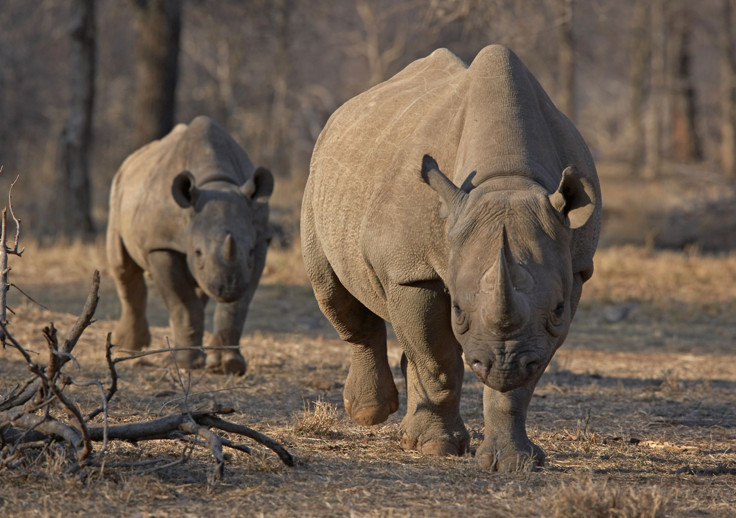Black Rhino Auction Controversy: Texas Hunters Offer Chance To Kill Rare Rhino In Name Of ‘Conservation’

Texas-based hunting group the Dallas Safari Club is trying a new, and controversial, approach to the conservation of black rhinos. According to NBC-DFW, the fundraiser to “save the black rhino” will include the auctioning of a hunting permit that will enable someone to kill a black rhino, an endangered species, in Namibia.
“First and foremost, this is about saving the black rhino,” Ben Carter, the Dallas Safari Club’s executive director, told AFP. “There is a biological reason for this hunt, and it’s based on a fundamental premise of modern wildlife management: Populations matter; individuals don’t. By removing counterproductive individuals from a herd, rhino populations can actually grow.”
The hunting group announced the auction earlier this month in a statement on its website. The group promises that, in addition to helping “manage and conserve the species,” the highest bidder will get to “import a rare trophy” to the U.S.
“The winning bidder may hire his or her qualified outfitter or guide to lead the hunt, which will be accompanied by Namibian wildlife officials,” the statement reads. The auction is set to occur in January of next year.
According to AFP, the Dallas Safari Club said the Namibian government “selected” it to receive a black rhino hunting permit for use in one of its national parks. Carter expects to fetch between $250,000 and $1 million for the permit, which the club plans to donate to the Conservation Trust Fund for Namibia’s Black Rhino.
Al Jazeera reported that every year, Namibia's government permits the killing of up to five of the country’s 1,795 black rhinos. The idea is that removing certain animals from the population -- older males, in particular -- allows other members of the herd to reproduce more freely.
"Black rhinos are very territorial so you will have an older male that is keeping younger males from reproducing," Tim Van Norman, chief of the branch of permits at the U.S. Fish and Wildlife Service, or FWS, told Al Jazeera. "By removing these older males from the population, you get an increase in the production of calves. Younger males are able to impregnate the females that are in that area so you get more offspring than from some of these older males."
Meanwhile, many people are not thrilled by the prospect of a fundraiser that encourages the killing of an endangered animal. "It seems counterintuitive to sell the ability to shoot an animal as a means to save a species," Rita Beving Griggs, a Dallas-based representative of the Sierra Club, told NBC.
"The world is seeing a concerted effort to preserve the very few black rhinos and other rhinos who are dodging poachers' bullets and habitat destruction,” Wayne Pacelle, president of the Humane Society of the United States, told Al Jazeera. "The last thing they need are wealthy elites from foreign lands coming in to kill them for their heads."
“It is bad enough that paid poachers kill for the horn's imaginary medicinal properties, but what is far worse is that the thoughtless pay for sport hunting resulting in yet one more dead endangered animal just so they can hang the decapitated head on their wall only to puff about it over cocktails,” writes Cindy Arent, the originator of an online petition aimed at stopping the auctioning of the rhino hunting permit.
Van Norman added that Namibia has determined certain black rhino males -- older ones that have already produced offspring and are in reproductive decline -- are the best targets for hunting.
There are only about 5,000 black rhinos left in the wild in Africa, and about 1,800 of them are in Namibia.
Over the past few years, rhino poaching has increased significantly across Africa. Since 2007 in South Africa alone, according to data from the South African Department, rhino poaching has seen a 5,000 percent increase. In Tanzania, an explosion in rhino poaching in the 1960s and '70s decimated the rhino population. Conservationists saw the rhino’s numbers fall from more than 1,000 to only 70.
African poachers kill at least one rhino a day in South Africa. They hunt rhinos for their horns, which are in high demand in China for traditional medical treatments.
© Copyright IBTimes 2024. All rights reserved.












